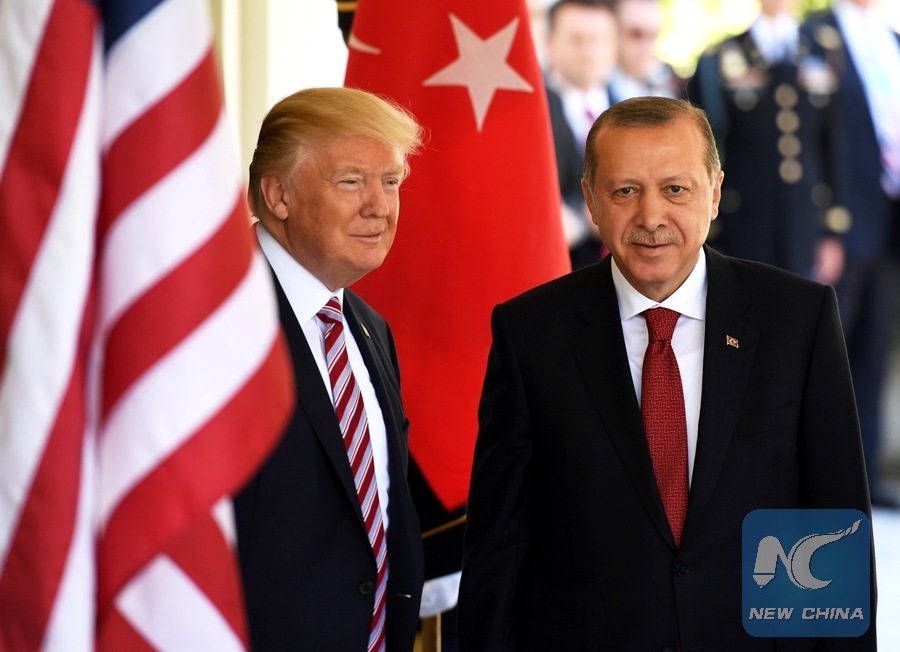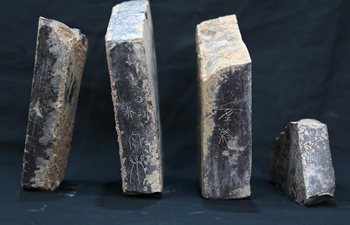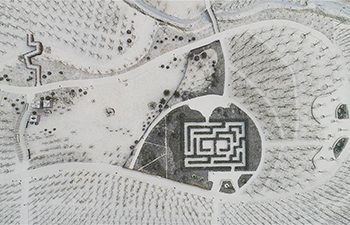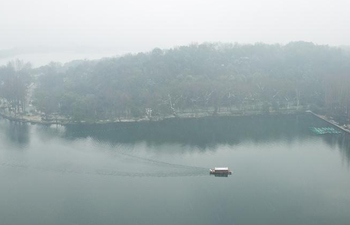
U.S. President Donald Trump (L) welcomes Turkish President Recep Tayyip Erdogan at the White House in Washington D.C., the United States, on May 16, 2017. (Xinhua/Yin Bogu)
By Burak Akinci
ANKARA, Jan. 29 (Xinhua) -- Turkish President Recep Tayyip Erdogan has vowed Sunday to clean the long border with Syria of "terrorists," a move that could increase the risk of a potential confrontation between Turkish and U.S. troops in the war-torn country, said local experts.
Turkey's Deputy Prime Minister and government spokesman Bekir Bozdag said Monday, the 10th day of the Turkish incursion, that U.S. troops will be targeted if they blend with Kurdish fighters.
However, he considered the risk of a face-to-face conflict as "of slim possibility" in the major operation launched on Jan. 20 by the Turkish army and Free Syrian Army to push Kurdish fighters from northern Syria.
The Kurdish fighters, outlawed by Ankara, have allied with the U.S. troops in the battles against the Islamic State (IS).
"A military clash between Turkey and the United States in Syria will bring an end to NATO," the military alliance of which both countries are members, said Ersan Sen, a law professor at the Istanbul Marmara University during a talk show.
Sen stressed that Turkey was fighting for its national security in Syria against the Kurdish militia of the People's Protection Units (YPG), considered as terrorists and suspected of forming a de-facto state on Turkey's border, amid deep frustration and distrust between the two NATO partners who enjoyed a "strategic partnership."
Only if Turkey succeeds, that there can be some sort of relief in the strained Turkish-U.S. relations by means of intensive dialogue, he argued.
The remarks came amid new statements from Turkish President Recep Tayyip Erdogan who vowed to clear Turkey's entire 900-km-long border of YPG presence, in a sign that the Turkish offensive in the Kurdish-held Afrin region could be extended 100 km further east to the city of Manbij where U.S. Special Forces are stationed.
Speaking to members of the ruling Justice and Development Party (AKP) in Ankara, Erdogan shrugged off U.S. calls on Turkey to limit its incursion, saying the next town to be targeted after the Kurdish enclave of Afrin, will be Manbij, raising the possibility of U.S. troops being drawn into the fight between Turks and Syrian Kurds.
On Sunday, several days after being dragged in mud and bad weather in mountainous terrain, Turkey intensified its Operation Olive Branch, taking the strategic Barsaya Hill near the border town of Azaz, said the Turkish Armed Forces.
Turkish relations with the United States have soured over the latter's military support for the YPG, which Ankara says is an offshoot of the outlawed Kurdistan Workers' Party (PKK).
U.S. President Donald Trump urged Erdogan last week to "de-escalate" his forces assault in Syria, expressing concern and call to limit the incursion.
The wording of a subsequent White House statement, however, was denied by the Turks but recurrent announcements from government officials in Ankara have added fuel to the fire of enlarging the offensive towards Manbij and even urging the United States to "immediately withdraw" its personnel there.
"We will rid Manbij of terrorists, as we promised before. Our battles will continue until no terrorist is left right up to our border with Iraq," Erdogan said to AKP members, vowing that the operation will prevent the Kurds from forming a corridor and reaching the Mediterranean.
The Turkish president vowed that after establishing a safe zone, the campaign would root out Kurdish fighters and rebuild infrastructure and institutions in the region.
The Turkish offensive was launched days after U.S. Secretary of State Rex Tillerson unveiled a controversial strategy of forming a Kurdish-led border force in Syria and thus an open-ended presence in Syria.
Some experts believe that a larger conflict looms if Erdogan decides to send his troops to Manbij, liberated from the Islamic State (IS) in 2016.
Russia, a key player in Syria and controls the skies over Afrin, Iran and the Assad regime have announced their profound disagreement about the recent U.S. announcements, making the issues more complicated.
But speaking to AKP members, Erdogan outlined a far more expansive operation than he's committed to before, indicating his readiness to order Turkish forces, along with thousands of allied Syrian rebels to drive across northern Syria all the way to Iraq.
The United States has 2,000 troops in Syria alongside the Kurdish-Arab alliance. Several hundreds of them are positioned near Manbij and a potential run-in with Turkish forces would be a nightmare scenario.
"There is little chance of a military confrontation between Turkey and the United States, but if it happens it will ruin what NATO stands for," said Oytun Orhan, a Syria expert at the Ankara-based think tank ORSAM.
Orhan believed that if Turkey's Afrin operation yields successful results, Ankara and Washington will both seek diplomatic ways to find a compromise on the Manbij front.
"Neither the United States nor Turkey would definitely want to clash militarily in Syria, I think Washington will eventually revise its strategy in order to address Turkey's security preoccupations," he added.
Metin Gurcan, a Turkish security expert said for his part that political and security bureaucrats in Ankara agree and are fully determined about the operation first to Manbij and then east of the Euphrates River to undermine U.S. cooperation with YPG.
But the former officer added in a recent article in the al-Monitor media website. "The longer the operation stretches out and the more territory it involves - especially if it leads to a confrontation with the United States - the more likely it is to harm Turkey's economy and stability."
Operation Olive Branch enjoys widespread public support in Turkey amid a media frenzy backing the offensive which is widely seen amongst Erdogan's supporters as a war waged against U.S. ambition in the Middle East.
Turkish authorities said that a total of 597 terrorists and five Turkish soldiers have been killed in clashes so far.
If Washington and Ankara do not set the necessary de-escalation mechanism, "things could get especially messy if Turkey expands operation to Manbij (...) as U.S. and Turkish forces could collide," warned the International Crisis Group analyst Noah Bonsey in a recent commentary.
This scenario would cause deeper damage to ties between the two partners, argued the expert, insisting that Washington needs Turkey's cooperation to play its role in settling Syria's war and has to reach a compromise with Ankara.
To do so, Turkey wants an immediate end to the arming of YPG by Washington who seems well aware that Erdogan is determined to clear once and for all the entire Turkish border of Kurdish fighters, according to sources who spoke to Xinhua.














